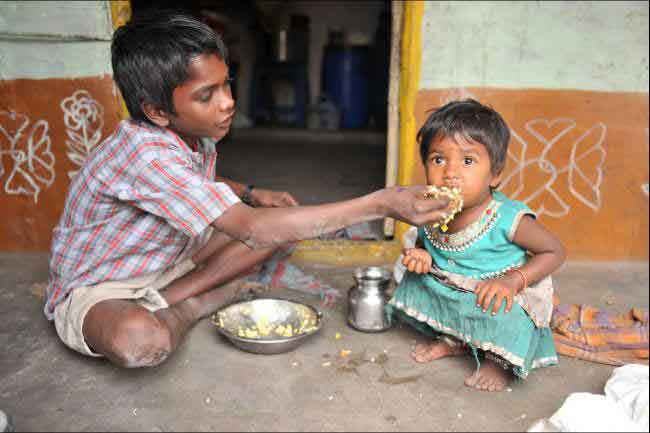In India, 9 out of 10 children under 2 years is deprived of adequate diet
In India, 9 out of 10 children under 2 years is deprived of adequate diet

New Delhi: As India celebrates the World Health Day, around 90 percent of its children are still struggling to get proper diet crucial for their development.
Nine out of ten children, in the age group of six to 23 months, do not receive adequate diet, as per the recent data released by NFHS (2015-16).
Deprived of a healthy start, millions of these children will bear the impact of this under-nutrition not just in early years of their childhood but throughout their lives. Illness in children and lack of adequate and appropriate nutrition is a vicious cycle, which needs constant attention through preventive as well as promotive approaches.
While the national figure is startling, many major states report even lower numbers, reflecting the appalling status on the ground. Four out of the five worst performing states are from North India.
Rajasthan sits at the bottom, where measly three percent children in the said age group receive adequate diet. Not much different is the state of affairs in Uttar Pradesh, where this figure stands at five percent approximately.
The national capital, being the centre of power ideally should have had better status, but shockingly, only six percent of children in this age group receive proper nutrition. Even the state (Tamil Nadu) which has the highest percentage of children receiving adequate nutrition, the number does not cross 31 percent.
Also Read: World Health Day- Eat heathy and beat the stress
Given the dismal state of maternal care in our country, it is likely that the impact on the health of the child started right from their mothers' womb, given the direct linkage. 50 percent of the pregnant women (15-49 years) were found to be anaemic according to NFHS 4 and only 21 percent received complete antenatal care.

Poor health of mothers adversely affects the physical and cognitive development of the child, rendering a very poor start to life and having lifelong implications.
Komal Ganotra, director, Policy, Research and Advocacy for CRY - Child Rights and You says, "The Integrated Child Development scheme, which addresses nutritional needs of children in an early age (under 6) and expectant mothers, has the right intent to ensure a solid foundation for children when maximum brain development occurs. It is non-negotiable for the state to ensure adequate budget and robust implementation mechanism for greater convergence of health and nutrition services for every child in the country."
Estimates based on NFHS 4 data shows that around 52 million children, under five years of age, are stunted in India, which means they have low height for their age. Such chronic and long term undernourishment impacts growth and development in critical years. Undernourishment coupled with low rates of complete immunisation (coverage currently stands at 62 percent) puts children at great risk.
Also Read: Now, a food guide to help you eat your way to sharper mind
Despite the soaring child malnutrition in the country, the funding for ICDS remains inadequate. Instead of increasing outlays, the budget allocation for the ICDS has declined by 9.6 percent since 2015. And the total allocation for child health in the union budget has remained stagnant over the last five years.
Investing in children early on ensures critical growth and development at an individual level and also has a larger effect on economic growth. Investment has to come from both the state through good health services as well as society/ parents through ensuring their children have adequate nutrition. (ANI)
 Dynamite News
Dynamite News 